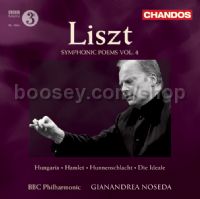Symphonic Poems vol.4 (Chandos Audio CD)
Symphonic Poems vol.4 (Chandos Audio CD)
* Estimated price converted from UK retail price
BBC Philharmonic / Noseda
This is the fourth volume of the BBC Phiharmonic’s five-disc cycle of Liszt’s Symphonic Poems, conducted by Gianandrea Noseda. This monumental survey continues to go from strength to strength through Noseda’s passionate conducting and innate Italian romanticism and has made possible a reappraisal of these unjustly neglected works. The Telegraph wrote, “…it is hard to imagine them ever sounding better than here. This is music-making full of rich colouring, refined shaping of melodic line and emotional power.”
Between 1848 and 1858 Liszt wrote twelve Symphonic Poems. He coined the term Symphonische Dichtung around 1853 to describe these musical works whose ideas were inspired by other art forms such as poetry or painting, or by characters and scenes. The works were particularly revolutionary for they are one-movement compositions, rather than the traditional four-movement form and pushed the boundaries of orchestration, form, harmony and structure.
In this fourth instalment, the BBC Philharmonic presents four key works in Liszt’s symphonic catalogue. Widely acknowledged as one of Liszt’s greatest works, Hamlet is rarely performed, yet widely acknowledged as one of Liszt’s greatest works, and chronologically the last of the symphonic poems to be composed. It was intended as an overture to Shakespeare’s play. Hungaria was composed following Liszt’s first return visit to Hungary in 1839 having moved from his homeland aged 11. He was welcomed with open arms as a great celebrity and artist by his compatriots Undoubtedly inspired by this visit, the post Vörösmarty wrote his patriotic ode ‘To Ferenc Liszt’ to which Liszt eventually responded with his episodic work, Hungaria. Die Ideale is a highly episodic work based on quotes from a poem by Friedrich Schiller and was first played in 1857 in Weimar, conducted by the composer. The final work, Battle of the Huns takes its inspiration from Kaulbach’s painting of Attila the Hun.




